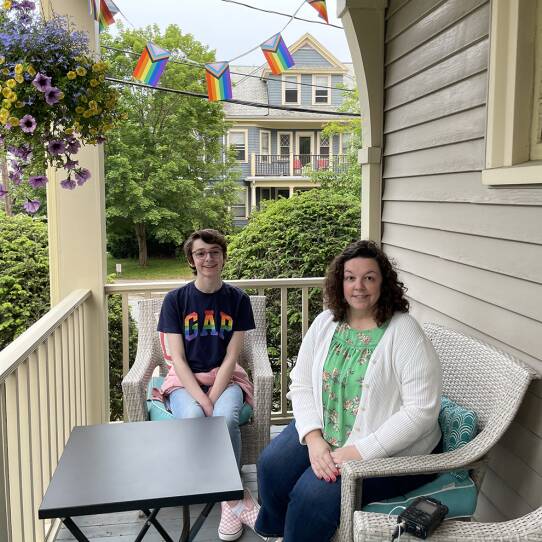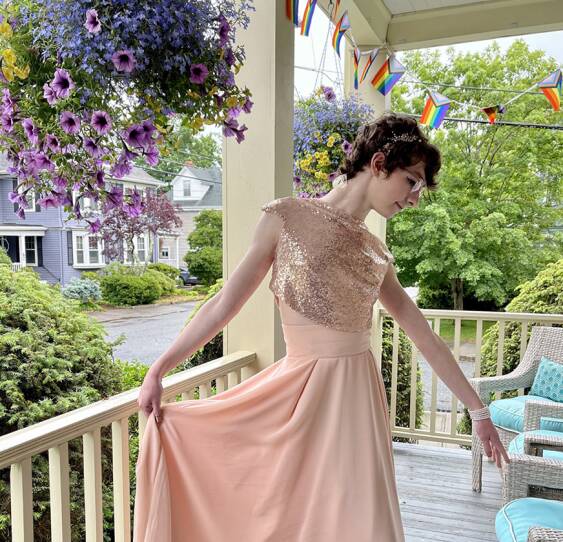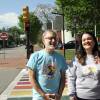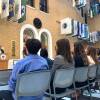LGBTQ+ Pride flags line the porch at Alison Coleman-Hardy’s 150-year-old Victorian home in Watertown. She said the rainbow flags serve as a backdrop to her life with her husband as they raise two queer youth, ages 13 and 17, who both serve as presidents at their schools’ Gender and Sexuality Alliances.
“I do feel, you know, proud that we’re doing right by our kids,” she said. “But I also think our kids have sort of taken the lead and sort of taught us a lot. And we haven’t been perfect at it.”
For Coleman-Hardy, LGBTQ+ Pride Month is a period of celebration as much as it’s a time for education. She hopes people will tap into resources that local organizations offer in June to learn about gender, sexuality and allyship.
But most of all, Coleman-Hardy wants her family to feel safe and supported amid uncertainty surrounding LGBTQ+ rights, legislation and shifting attitudes. She’s been disheartened by anti-LGBTQ incidents in recent months.
“I think in Massachusetts, we thought we’re in a bubble,” she said, “and we’re not.”
Vivian Flan, Coleman-Hardy’s oldest child, is nonbinary and has encountered challenges at school. They have access to just one gender-neutral bathroom at Watertown High School, and earlier this year they had to get permission from the superintendent in order to share a room with a female student on a chorus trip.
Last week, Flan was excited to get dressed up for prom, opting for a sparkly blush pink dress and posing for glamour shots at home before the dance.
Flan knew others might not respond kindly to their clothing choice, so they took precautions to stay safe and enjoy the night.
“I hung out with my friends. I never really was separated from them,” Flan said.
Coleman-Hardy said in addition to being a big moment for her child, it was a major step for the school and the community.
“I think — I don’t have proof of it — that you’ve set a precedent with being the first kid assigned male at birth who showed up in a dress at prom,” she said to Flan. “And you looked amazing, and you slayed.”

But Coleman Hardy and local advocates worry about a rise in public anti-LGBTQ actions in Massachusetts. Protesters have disrupted drag queen story hours hosted at local libraries, for instance, on several occasions.
“I think we’re in a precarious situation,” said Nina Selvaggio, the executive director at Greater Boston PFLAG, an organization that advocates for LGBTQ+ individuals and their families. “Here in Massachusetts, we think we are incredibly safe and evolved and really, really lucky — which in some ways we are, compared to what’s happening in the rest of the country.”
But hundreds of bills have been proposed in state legislatures that target LGBTQ+ people, including recently approved legislation in Florida that prevents transgender youth from participating in school sports.
“There’s massive backlash that is being orchestrated,” Selveggio said, adding that trans people have become the “focal point” of hate and fear.
On the other hand, Coleman-Hardy said there is an intersectional approach happening within the push for LGBTQ+ rights alongside diversity, equity and inclusion efforts in the workplace.
“I think they can’t all exist in a vacuum,” Coleman-Hardy said. “The intersectionality of all the things is already there. They’re tied together. The movements are tied together in many ways. And I think I have lots of hope for the future in that way, because I see it in my workplace and in other workplaces.”
Through the Greater Boston PFLAG speaker’s bureau, Coleman-Hardy has shared her family’s story in some office events.
Boston Public Library is hosting several Pride events and offerings, according to Michael Colford, director of library services. Those include the “We Are Pride” list of book recommendations for children and adults that reflect the diverse experiences within the LGBTQ+ community. And despite the protests that have popped up around drag queen story times, there are several scheduled at BPL campuses in Boston.
“Fortunately, nothing has happened at the Boston Public Library’s series with any of these [programs] and they’re very beloved,” Colford said. “We always have large crowds at our drag queen story time. So, it’s always a positive experience, and people have a great time.”
The Peabody Essex Museum in Salem is home to a slate of events to celebrate Pride for families and young adults, including a fashion show that takes place around the summer solstice. Danielle Olsen, associate director of education and civic engagement at the museum, said the programs look to showcase meaningful and authentic experiences for the community.
“We’re encouraging people to celebrate Pride on the longest day of the year by dancing the night away to tunes from legendary DJ Ana Matronic and strolling through a collaborative fashion presentation from designer Hogan McLaughlin and Bill Crisafi,” she said.

Coleman-Hardy said Pride helps her and others keep up with the ever-changing landscape of the LGBTQ+ community. She said Pride allows LGBTQ+ people to take ownership of what it means to be themselves and find strength as a collective, amplifying each other’s voices.
“I think that some of the reason we’re seeing such a pendulum swing and an uptick in this sort of anti-[LGBTQ] movement is that Gen Z, which my kids belong to, and the generation beneath them are louder. They’re more out than any generation has ever been before,” she said.
And Coleman-Hardy wants them to get louder and fight harder.
Flan credits Pride events for giving them courage to be who they are, they said, and motivating them as they deal with all the cultural shifts.
“I probably would have had a lot less confidence to, like, do the things I enjoy, dress the way [I do], how I want to kind of make all those little expression choices,” Flan said. “And I’d probably be generally less happy.”
They hope that increased visibility will help promote understanding and acceptance, but also reduce dismissive and harmful behavior toward the LGBTQ+ community.
“No place is where it could be yet,” Flan added. “And I believe that there's always definitely so much room to move forward through acceptance and representation and portrayal.”








